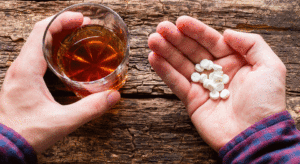 HYANNIS – Mixing a cocktail may be a relaxing way to unwind, but mixing drinking and medications could be a recipe for disaster.
HYANNIS – Mixing a cocktail may be a relaxing way to unwind, but mixing drinking and medications could be a recipe for disaster.
“Alcohol can adversely interact with hundreds of different medications, including some over-the-counter medications and some herbal treatments,” said Angela Medeiros, PharmD, director of Outpatient Pharmacy Services for Cape Cod Healthcare Retail Pharmacy.
“The additive effects of combining the medication and the alcohol can be really dangerous. It can put you at higher risk for overdose, falls and traffic accidents,” she said.
Among the medications that can have negative interactions with alcohol are opioids, anxiolytics (anti-anxiety medications) and sleep medications.
“They have a similar side effect profile and, combined with alcohol, can lead to increased drowsiness and dizziness, and even an increased risk of overdose,” she said.
The dangers of interactions are worse for older adults, in part because they metabolize alcohol more slowly.
“People who are of advanced age are already at a higher risk for falls, without alcohol and without the medications,” she said. “When you’re already at risk for falling because of joint issues or other health conditions, then you add on top of that some medications and then you add on top of that a glass or two of alcohol, you find yourself at a greatly increased risk for something bad to happen.”
Some drugs, including Flagyl (the brand name for metronidazole), can have a rapid interaction with alcohol known as a disulfiram-like reaction.
“This reaction can be very severe and includes nausea, vomiting, headaches, and flushing. It may also lead to sudden death,” Medeiros said.
With other medications, the interaction is minor but still bothersome, such as an upset stomach or headache.
Changes in Effectiveness
Another thing to keep in mind is that alcohol can reduce the effectiveness of some prescription medications.
“It changes the way they are absorbed by the body and broken down by the liver,” Medeiros said. The enzymes produced by the liver to process alcohol also break down a medication for epilepsy, for one example, so it no longer has the same effect.
Over-the-counter (OTC) medicines also can interact with alcohol. Combining alcohol and antihistamines can lead to drowsiness and dizziness.
“Tylenol is considered to be very safe for most people, but it can have an adverse effect on the liver if you take high doses for a long period of time. If you’re drinking alcohol, you may not feel a reaction right away, but the cumulative effect over the long term could be harmful.”
The good news is that a single drink will not affect most medications.
If you’re on some new medications or a combination of medications, check with your prescriber or your local pharmacist about possible interactions. Proceed with caution, but best of all, informed caution.
The National Institute on Alcohol Abuse and Alcoholism has a list of commonly used prescription and OTC medicines that interact with alcohol.























